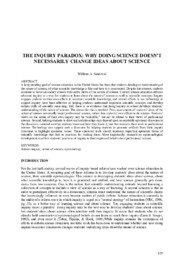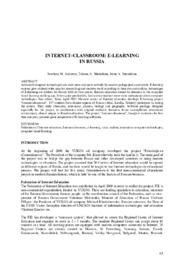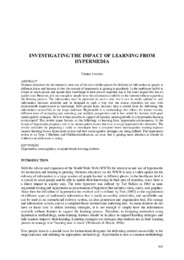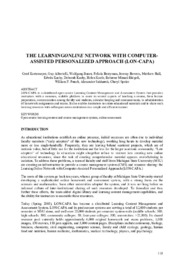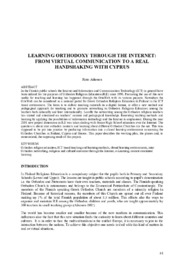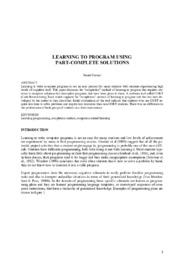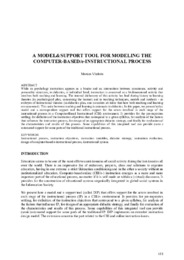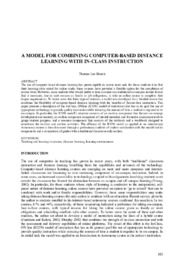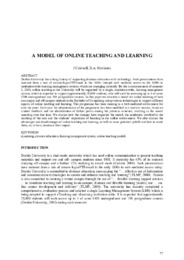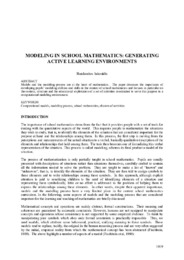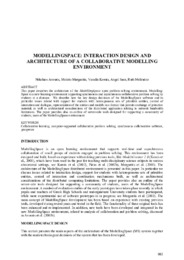Browsing CBLIS Conference Proceedings 2003 Volume I: New Technologies and their applications in education by Title
Now showing items 52-71 of 120
-
Information and communication technology; First-aid to the private tutoring problem?
(Department of Educational Sciences, University of Cyprus, 2003)In the past pupils at the elementary and high schools were only complaining about homework. Nowadays they must be rightfully complaining about private tutoring. Private tutoring has been seen by many as the plague of our ... -
The inquiry paradox: why doing science doesn't necessarily change ideas about science
(Department of Educational Sciences, University of Cyprus, 2003)A long standing goal of science education in the United States has been that students develop an understanding of the nature of science, of what scientific knowledge is like and how it is constructed. Despite this interest, ... -
Instructional software programs used in the Romanian higher education system
(Department of Educational Sciences, University of Cyprus, 2003)The social and political framework from Romania and the new technological revolution issued a revolution in the Romanian education system. There were initiated new forms of education and new instruction fields. Software ... -
Integrating information and communication Technology into teaching and learning - a Second level course for prospective teachers
(Department of Educational Sciences, University of Cyprus, 2003)Commonly, introductory-level courses on Information and Communication Technology (ICT) for prospective teachers focus on the development of knowledge and skill with the use of technology tools. These types of courses are ... -
Internet facilities for virtual and hands-on educational experiments
(Department of Educational Sciences, University of Cyprus, 2003)Real time computer simulators of the standard educational Physics laboratory works were designed in VRML and Java for distant learning and self-studies of University students. Experimental schemes and software were developed ... -
Internet-classroom: e-learning in Russia
(Department of Educational Sciences, University of Cyprus, 2003)Advanced computer technologies are used more and more actively by modern pedagogical community. E-learning courses give students wide area for researching and creative work according to their own curriculum. Advantages of ... -
Investigating the impact of learning from hypermedia
(Department of Educational Sciences, University of Cyprus, 2003)Distance education via the internet is now one of the most viable options for delivery of information to people in different places and because of this the concept of hypermedia is gaining in popularity. In the healthcare ... -
Labassistant: a web-based general-purpose software for the delivery and administration of computer based laboratory sessions
(Department of Educational Sciences, University of Cyprus, 2003)The design of a web-based general-purpose software system, named LabAssistant, that supports computer-based laboratory sessions is presented. The aim of LabAssistant is to provide support to the preparation, conduct, ... -
The learning online network with computer-assisted Personalized approach (lon-capa)
(Department of Educational Sciences, University of Cyprus, 2003)LON-CAPA is a distributed open-source Learning Content Management and Assessment System that provides instructors with a common, scalable platform to assist in several aspects of teaching a course, from lecture preparation, ... -
Learning orthodoxy through the internet: from virtual communication to a real handshaking with cyprus
(Department of Educational Sciences, University of Cyprus, 2003)In the Finnish public schools the Internet and Information and Communication Technology (ICT) in general have been utilized for the purposes of Orthodox Religious Education (R.E) since 1998. Promoting the use of this new ... -
Learning to program using Part-complete solutions
(Department of Educational Sciences, University of Cyprus, 2003)Learning to write computer programs is not an easy process for many students with students experiencing high levels of cognitive load. This paper discusses the “completion” method of learning to program that requires ... -
Metabook. Evaluating the possibilities of e-books in schools
(Department of Educational Sciences, University of Cyprus, 2003)The objective of METABOOK project is to investigate the possibilities of e-books in the classroom and in the education field in general, as a possible replacement of traditional “paper books”, in order to minimize the cost ... -
A model & support tool for modeling the computer-based/e-instructional process
(Department of Educational Sciences, University of Cyprus, 2003)While in psychology instruction appears as a binder and an intersection between conscience, activity and personality structures, in didactics, at individual level, instruction is conceived as a bi-dimensional activity that ... -
A model for combining computer-based distance learning with in-class instruction
(Department of Educational Sciences, University of Cyprus, 2003)The use of computer-based distance learning has grown rapidly in recent years and, for those students who find their learning style suited for online study, these courses have provided a flexible option for the completion ... -
A model of online teaching and learning
(Department of Educational Sciences, University of Cyprus, 2003)Deakin University has a long history of supporting distance education with technology. Such presentations have matured from a mix of remote-login/FTP/email in the 1980s through web mediated access in the 1990s to ... -
Modeling in school mathematics: generating active learning environments
(Department of Educational Sciences, University of Cyprus, 2003)Models and the modeling process are at the heart of mathematics. The paper discusses the importance of developing pupils’ modeling abilities and skills in the context of school mathematics and focuses in particular on the ... -
Modellingspace: interaction design and architecture of a collaborative modelling environment
(Department of Educational Sciences, University of Cyprus, 2003)This paper describes the architecture of the ModelllingSpace open problem-solving environment. Modelling- Space is a new learning environment supporting synchronous and asynchronous collaborative problem solving by students ... -
Modellingspace: the setting up of human networks as vital part of the design and implementation of a technology-supported learning environment
(Department of Educational Sciences, University of Cyprus, 2003)The ModellingSpace (MS) project is concerned with developing and implementing a computer-based modelling learning environment in actual school contexts and preparing an education programme for the teachers involved in it. ... -
Moving from local to global teaching: integrating appropriate technologies – a reflection
(Department of Educational Sciences, University of Cyprus, 2003)There are many reasons why universities and other tertiary education institutes are moving away from providing local (or face-to-face) teaching to global teaching. Our School of Computer and Information Science is one that ... -
New steps in the organisation of the school activity in the french secondary schools: the Changing role of physics teachers
(Department of Educational Sciences, University of Cyprus, 2003)Since the introduction in 2000 of the Personal Guided Projects (TPEs in French) for students, which are a new educational form of learning in the French secondary school, the role of physics teachers has changed. The aim ...

